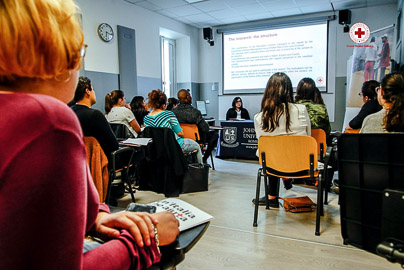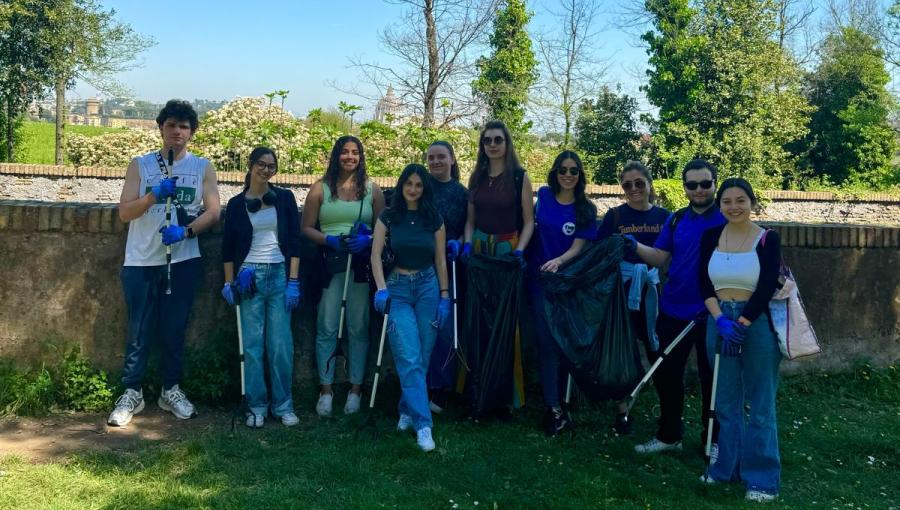Multiple Diversities in the Migrant Population: JCU Welcomes Italian Red Cross
The Community Service Office invited Daria Russo, a psychologist who works for the “Comitato di Croce Rossa di Roma” and Mariangela Iorio, an external consultant for the Italian Red Cross to JCU on Thursday, April 18, 2019. The two Red Cross representatives discussed “Multiple Diversities,” a newly released study conducted with the support of UNAR, Italy’s National Anti-Racial Discrimination Office. The research project was born from a desire to acknowledge the existence and experiences of LGBTQ+ migrants in Italy because their stories have rarely been given space in the realm of migration studies. “Multiple Diversities” focuses on understanding and determining the level of psychological distress and mental health issues that affect migrants who belong to the LGBTQ+ community.
The audience also had the invaluable opportunity to hear the touching testimonial of a person who identifies as an LGBTQ+ migrant, who preferred to remain anonymous.

The Italian Red Cross Presents: “Multiple Diversities”
The topic of migration has been in the Italian news and political agenda for quite a few years. Migrants who arrive in Italy inevitably bring differences: they have different ethnicities, belong to different religious groups or affiliations, speak different languages, and have different cultural backgrounds. Their interaction with Italian society is therefore challenging, given that these differences are sometimes perceived as obstacles to integration – rather than enriching features – by Italians.
Because migrants are discriminated against and in many ways excluded from the surrounding culture and society, they are a vulnerable minority that suffering from great psychological distress. But what happens when several types of diversity overlap? What are the psychological implications on those who are not only stigmatized for being migrants, but also for belonging to the LGBTQ+ community? “Multiple Diversities” tries to answer these questions, despite limitations such as homophobia being widespread within the migrant communities in Reception Centers and the fact that many of the migrants who belong to the LGBTQ+ community do not feel safe to reveal their sexual orientation or gender identity to the members of their community, let alone to strangers.
The research was conducted via anonymous tests and questionnaires with a sample of 302 migrants – some of whom refused to answer many questions, proving the sensitive nature of the topic. The participants were from Ivory Coast, Egypt, Mali, Nigeria, New Guinea, Senegal, Syria, and Togo. Only 202 of the migrants – 178 men and 28 women (that does not equal 202) – completed both the test and the questionnaire, and merely 22 among them declared to be openly gay.
The outcome of the research shows that LGBTQ+ migrants suffer from greater psychological distress than their heterosexual peers. Resiliency levels were higher in heterosexual migrants, which explains why LGBTQ+ migrants are generally more exposed to the use of drugs and alcohol as coping mechanism. LGBTQ+ migrants also suffer more from obsessive-compulsive disorders, sleeping disorders, depression, phobic anxiety, and more somatization compared to heterosexual migrants. They are faced with the challenge of coming to terms with their sexual orientation and gender identity in a new cultural setting – where their trauma with homophobia is revived. “Multiple Diversities” also reveals that LGBTQ+ migrants themselves have internalized homophobia, which compels these individuals to develop extremely negative feelings toward their sexual orientation. Internalized homophobia is responsible for many hostile and dysfunctional behaviors, a sense of worthlessness, and suicidal thoughts.
All the students who participated are very committed Community Service volunteers and were very grateful to learn from professionals in the humanitarian field.





